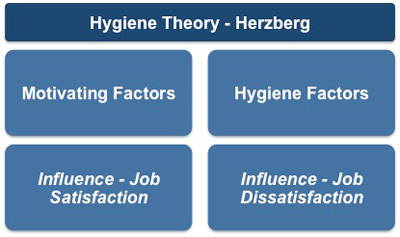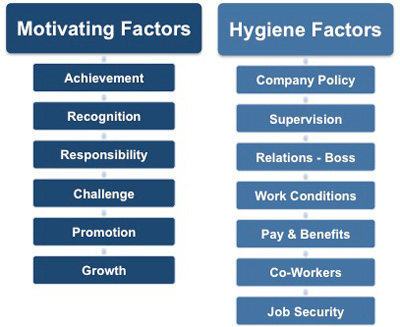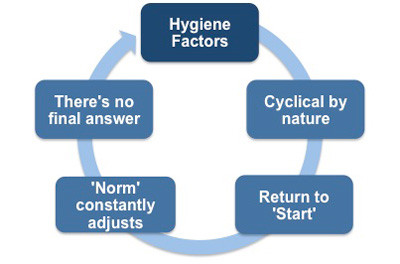Herzberg's Hygiene Theory of Motivation
The first piece of research that interests us was undertaken by Fredrick Herzberg in 1959 to investigate 'satisfaction at work.' The result of this research became known as Herzberg's Hygiene Theory (or the Two Factor Theory) and showed that those factors that gave a person satisfaction at work and those that resulted in dissatisfaction are quite different in nature.
 |
Herzberg referred to those things that influenced job satisfaction as 'Motivating Factors,' whilst he called those that influenced dissatisfaction at work 'Hygiene Factors.'
Motivating factors include: achievement, recognition, challenge, responsibility, promotion, and personal growth. As a manager, you can improve a team member's satisfaction in their work by making positive changes to the work itself, for example by providing opportunities to achieve goals or take on more responsibility.
 |
To prevent dissatisfaction you should focus your efforts on hygiene factors. These include things like salary, benefits, job security, working conditions, supervision, company policy, procedures, and relationships with co-workers.
His findings showed that these two sets of factors act independently of each other and that increasing your team's satisfaction level will not automatically lead to a lower level of dissatisfaction. For example, if a team member is not motivated by the goals they are set then this problem will not go away simply because they are given a pay rise.
This is because the increased level of pay quickly becomes the norm. The same thing applies to improvements in working conditions, better relationships within their team, or any of the other hygiene factors already mentioned.
 |
The cyclical nature of these hygiene factors means that you cannot reap the benefit of improving any of them for very long. The best that you can hope for is to keep the dissatisfaction at a sufficiently low level to avoid excessive staff turnover and absenteeism.
You can only make a lasting positive impact on your team's attitude by working on both hygiene factors and motivating factors together on an ongoing basis.
If you inherit a poorly performing team when you take on a new role or join a new organization your first action should be to identify the negative factors causing poor performance. You can then assess how easily you can alter the hygiene factors and what changes to make to the motivating factors, because to make any real changes in performance you need to address both. This Team Productivity Template provides you with three steps that will help you to identify the issues affecting your team's productivity.
You may also be interested in:
Team Performance Problems | Common Fallacies About Leading Teams | Six Silent Barriers to Performance | Five Key Team Performance Factors | Matrix Management Issues | Qualities of Leadership | GroupThink and in-group Behavior.



